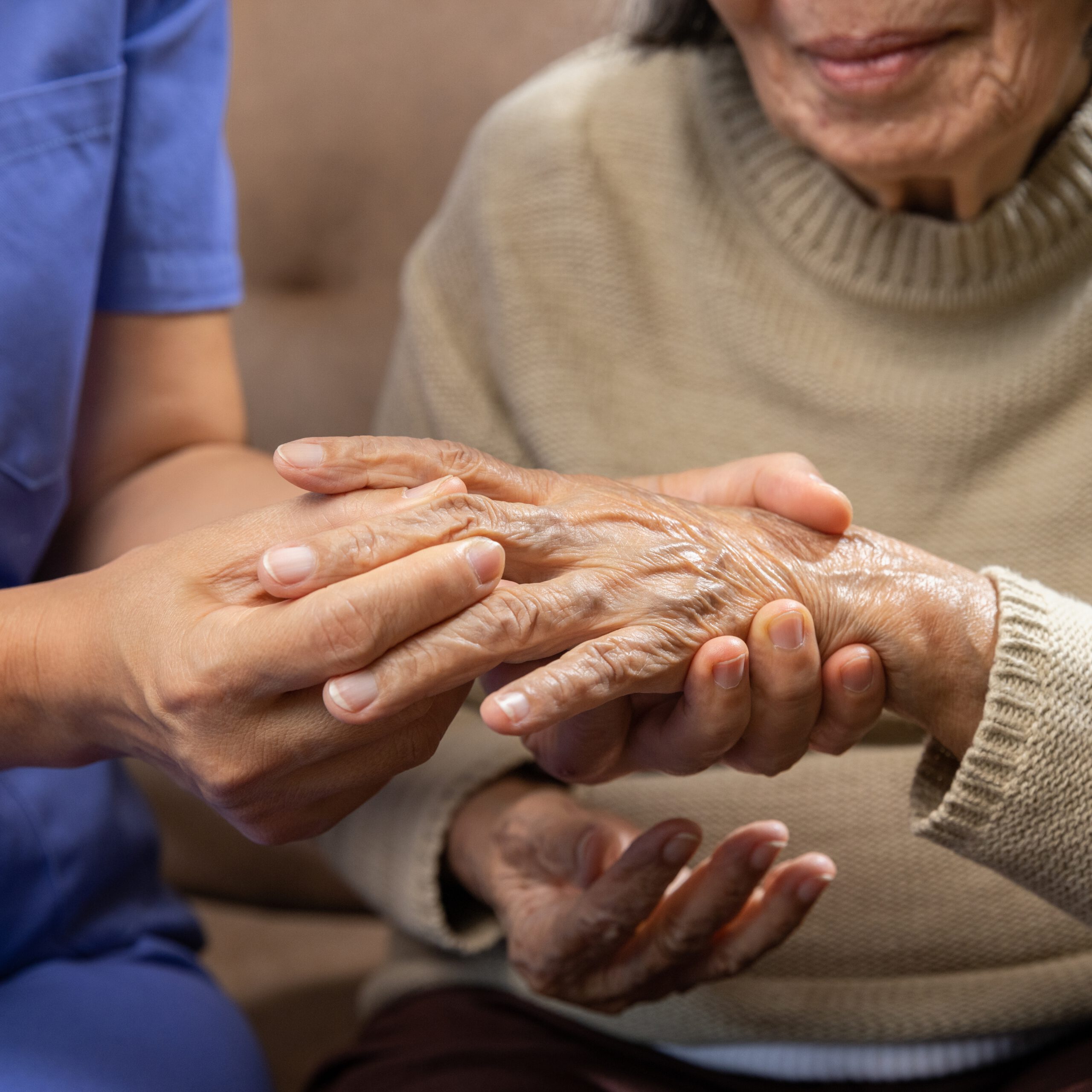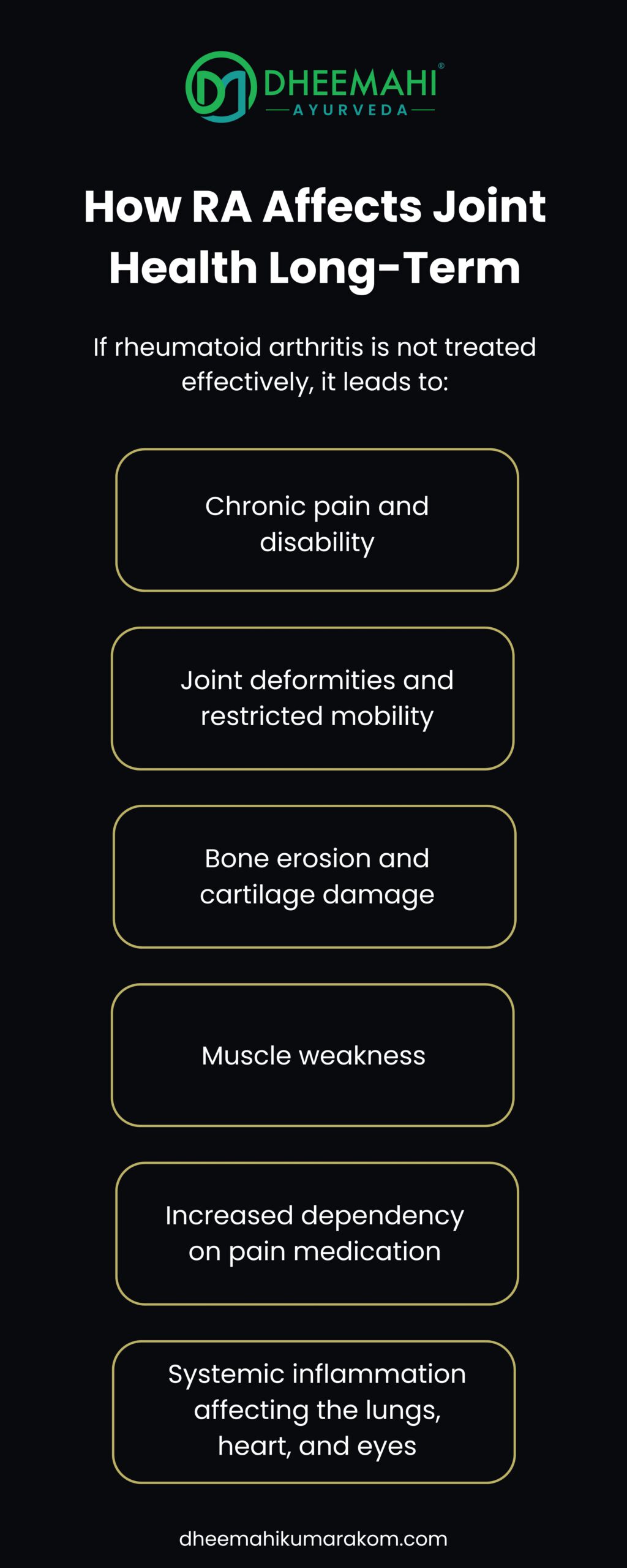Ayurveda Treatment for Joint Pain Caused by Rheumatoid Arthritis
Rheumatoid Arthritis (RA) is a chronic autoimmune condition that causes painful inflammation in the joints. Unlike osteoarthritis, which results from wear and tear, RA is caused by the immune system mistakenly attacking the synovium the lining of the joints resulting in swelling, pain, stiffness, and eventual joint deformity if not managed properly.
For many individuals suffering from rheumatoid arthritis joint pain, conventional treatment options involve lifelong dependency on painkillers, steroids, or immune-suppressing drugs. However, these may come with side effects and do not offer a permanent solution. In contrast, joint pain provides a natural and holistic pathway to healing by addressing the root causes rather than just controlling symptoms.
we offer personalized, doctor-led Ayurvedic care for chronic conditions like RA, helping patients experience lasting relief, improved joint function, and better quality of life without relying on chemical medication.
What is Rheumatoid Arthritis?
In Ayurveda, Rheumatoid Arthritis closely aligns with a condition called Amavata. The term is a combination of two Sanskrit words:
- Ama: Undigested toxins that accumulate in the body due to poor digestion.
- Vata: The dosha responsible for movement, especially in joints and muscles.
Amavata occurs when Ama (toxins) circulate through the body and lodge in the joints, disrupting the balance of Vata dosha, resulting in stiffness, swelling, and pain.
In RA, the immune system is overactive. Ayurveda understands this as a systemic imbalance of the doshas and impaired Agni (digestive fire), which triggers a response that damages the body’s own tissues.
Early Signs and Symptoms of Rheumatoid Arthritis Joint Pain
RA typically starts with mild symptoms that gradually worsen. Ayurvedic diagnosis focuses on identifying these early signs to prevent long-term damage.
Common symptoms include:
- Persistent joint pain, especially in smaller joints (fingers, wrists)
- Morning stiffness lasting more than 30 minutes
- Swelling and redness in multiple joints
- Symmetrical joint pain (same joints on both sides of the body)
- Fatigue, loss of appetite, low-grade fever
- Joint deformities in later stages
In Ayurveda, the presence of Ama leads to heaviness, sluggishness, poor appetite, and joint stiffness, particularly in the early mornings and cold weather.
Causes of RA According to Ayurveda
Ayurveda considers rheumatoid arthritis joint pain as a result of deep-seated imbalances. Some of the major contributing factors include:
1. Poor Digestion and Weak Agni
Impaired digestion creates Ama, which circulates through the body and settles in the joints. This Ama is sticky, heavy, and obstructs the normal movement of Vata, leading to pain and swelling.
2. Aggravation of Vata Dosha
Vata governs movement and flexibility. When disturbed by improper diet, irregular lifestyle, cold exposure, or stress, it accumulates in joints and nerves, causing dryness, cracking, and severe joint pain.
3. Wrong Food Combinations and Heavy Diets
Eating incompatible foods (e.g., dairy with salty or sour items, or meat with curd), heavy, oily, or processed foods creates metabolic overload, contributing to Ama and worsening the condition.
4. Cold and Damp Weather
Cold climate tends to aggravate Vata and encourage Ama accumulation. This is why symptoms of rheumatoid arthritis joint pain typically worsen during winters.
5. Mental Stress
Stress, anxiety, and emotional disturbances disturb all three doshas, especially Vata, further weakening the immune system and digestive fire.
How RA Affects Joint Health
If rheumatoid arthritis is not treated effectively, it leads to:
- Chronic pain and disability
- Joint deformities and restricted mobility
- Bone erosion and cartilage damage
- Muscle weakness
- Increased dependency on pain medication
- Systemic inflammation affecting the lungs, heart, and eyes
Therefore, early intervention through Ayurveda treatment for joint pain is crucial to slow the progression and support the body’s natural healing capacity.
Diagnosis of Amavata at Dheemahi Ayurveda
Before beginning any treatment, our experienced Ayurvedic doctors conduct a thorough assessment using:
- Pulse diagnosis (Nadi Pariksha) to assess dosha imbalance
- Detailed diet and lifestyle history
- Evaluation of digestive strength (Agni)
- Presence and type of Ama
- Joint examination for swelling, temperature, and mobility
This personalized diagnosis allows us to create a treatment protocol that targets the root cause of pain and inflammation in each individual patient.
Ayurvedic Treatment for Rheumatoid Arthritis Joint Pain
Treatment for rheumatoid arthritis joint pain in Ayurveda follows a multi-step process aimed at:
- Eliminating Ama (toxins)
- Pacifying the aggravated doshas (especially Vata)
- Rebuilding digestive strength
- Strengthening joint tissues
- Preventing relapse and deformity
Here’s how the protocol unfolds:
1. Langhana and Deepana – Reducing Toxins and Rekindling Agni
Initial treatment focuses on digestive fire correction. This includes:
- Light fasting or mono-diets (as prescribed)
- Herbal decoctions to improve digestion and clear Ama
- Avoiding heavy, sweet, and dairy-rich foods
These steps help reduce inflammation and prepare the body for deeper detoxification.
2. Panchakarma – Detoxification and Rejuvenation
Once the Ama is reduced, Panchakarma therapies are used to expel deep-rooted toxins from the body and rebalance the doshas.
The therapies are selected based on individual assessment, and may include:
- Virechana (Purgation): Eliminates excess Pitta and inflammatory toxins
- Basti (Medicated Enema): The most effective treatment for Vata-induced joint pain
- Abhyanga (Oil massage): Nourishes joints and improves circulation
- Swedana (Steam therapy): Reduces stiffness and pain
- Patra Pinda Sweda (Herbal poultice massage): Reduces inflammation and improves joint mobility
At Dheemahi Ayurveda Village, these procedures are conducted under the supervision of senior physicians, ensuring safety and efficacy.
3. Shamana – Internal Medicines and Herbal Support
Following Panchakarma, patients are prescribed customized herbal formulations that:
- Reduce inflammation naturally
- Nourish joint tissues (Shleshaka Kapha)
- Prevent recurrence of Ama
- Strengthen the immune system
- Improve digestion and metabolism
Herbs are only prescribed after careful analysis, ensuring compatibility with the individual’s constitution and condition.
4. Rasayana – Rejuvenation and Tissue Repair
In the final stage of treatment, rasayana therapies are introduced to promote regeneration of joints and enhance longevity.
Benefits include:
- Improved flexibility and mobility
- Stronger bones and cartilage
- Balanced immune response
- Reduced stress and mental clarity
Rasayana chikitsa is vital in preventing relapse and ensuring long-term management of rheumatoid arthritis joint pain.
Diet and Lifestyle for Managing RA in Ayurveda
Ayurveda emphasizes that food is medicine. Correct diet and routine are essential to maintaining balance and preventing flare-ups.
Recommended Dietary Practices:
- Eat warm, freshly cooked, light meals
- Favor bitter, pungent, and astringent tastes
- Avoid incompatible foods like curd and fish, or fruit with milk
- Stay hydrated with warm water and herbal teas
- Limit sugar, fermented foods, and cold drinks
Lifestyle Tips:
- Maintain a fixed daily routine (dinacharya)
- Practice gentle yoga and stretching to improve mobility
- Avoid exposure to cold and damp environments
- Reduce stress with meditation, pranayama, and self-care
These holistic practices enhance the effects of joint pain and help reduce dependency on medications.
Why Choose Dheemahi Ayurveda Village for Rheumatoid Arthritis Care?
At Dheemahi Ayurveda Village, we believe in root-cause healing through authentic Ayurvedic wisdom. What sets us apart:
- Doctor-led consultations with customized diagnosis
- Non-commercialized approach-no generic medicine selling
- Personalized Panchakarma detox therapies
- Safe, herbal, and time-tested formulations
- Holistic care for both physical and mental well-being
- Long-term support and follow-ups for chronic cases
Our patients consistently report reduced joint pain, improved flexibility, and greater overall wellness through our structured programs.
Conclusion
Living with rheumatoid arthritis joint pain can feel overwhelming, especially when conventional methods offer only symptom control. Ayurveda offers hope-by working on the root cause of pain, inflammation, and immune disturbance.
Through personalized detox, dosha balancing, rejuvenation, and guided lifestyle change, joint pain brings genuine and lasting improvement in both joint health and overall vitality.
At Dheemahi Ayurveda Village, we help you reclaim your movement, flexibility, and energy through doctor-led, classical Ayurvedic care.
How Our Booking Process Works
The unique approach involves a series of discussion during your initial decision-making process to make sure that we will be able to match your expectations with our treatment.
Based on the discussions with you our team of expert doctors will design the best treatment package personalized for your needs.
01
Consultation Form
Fill out our consultation form, and let us know when will you be available for our doctor to talk to you
02
Discussion with Doctor
Discuss your health condition and expectations with our doctor.
03
Booking Confirmation
Confirm the booking by making a payment of 50% advance.
Consultation Form
Submit this form to initiate a booking with us
Have any queries? We will help you. Talk to us now
Say Goodbye to Health Woes & Hello to Healthy Living
Dheemahi Ayurvedic Pvt Ltd
12/386 Varaputhara Road
Kumarakom, Kerala, India
Pin 686563
Dheemahi Ayurvedic Centre, Near Neelimangalam Bridge, Kumaranaloor, Perumbaikad.P.O, Kottayam, Kerala, India, Pin 686016
Other Treatments
Karkidaka Chikilsa | Ayurvedic Treatment for Depression | How to Reduce Stress Naturally | Autoimmune Disorders | Mental Health Ayurvedic Treatment | Weight-Loss Treatment | Frozen Shoulder Ayurvedic Treatment | Diabetes Ayurvedic Treatment | PCOS Ayurvedic Treatment | Celiac Disease Treatment | ayurvedic treatment for skin diseases | nervous system ayurvedic treatment | Back Pain Ayurvedic Treatment | Cervical Spondylitis Ayurvedic Treatment | ayurvedic treatment for blood sugar | Fatty Liver Ayurvedic Treatment | Knee Pain Ayurvedic Treatment | Migraine Ayurvedic Treatment | Osteoarthritis Ayurvedic Treatment | Psoriasis Ayurvedic Treatment | Sinusitis Ayurvedic Treatment | Ayurvedic Detox Treatment | Migraine Ayurvedic Treatment | Ayurvedic Treatment for Rheumatoid Arthritis | Ayurvedic treatment for joint pain | Ayurvedic treatment for ulcerative colitis | Panchakarma Treatment |


